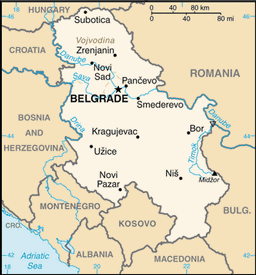Serbia
 Serbia is country of Europe located in central Europe.
Serbia is country of Europe located in central Europe.
Details
| Official Name: | Republic of Serbia |
| Capital: | Belgrade |
| Total area: | 88 361 km2 |
| GDP per capita: | $13,004 |
| Native Language: | Serbian |
| Government: | Parliamentary republic |
| Population: | 7,186,862 |
| Major Religion: | Eastern Orthodox Christianity |
| Monetary Unit: | Serbian dinar (RSD) |
Serbia, officially the Republic of Serbia, is a country located at the crossroads of Central and Southeast Europe, covering the southern part of the Pannonian Plain and the central Balkans. A landlocked country (78 km from the Adriatic sea), Serbia borders Hungary to the north; Romania and Bulgaria to the east; Macedonia to the south; and Croatia, Bosnia, and Montenegro to the west; also, it borders Albania through the disputed territory of Kosovo. The capital of Serbia, Belgrade, is among Europe's oldest cities, and one of the largest in East Central Europe.
Economy
Serbia has a transitional economy mostly dominated by services, manufacturing and agriculture. The economy is heavily reliant on exports and foreign investment. Since 2000, Serbia has attracted over $25 billion USD in foreign direct investment (FDI). Although average GDP growth over ten years has been 4.45% per year, Serbia suffers from a high unemployment rate (23.7% as of February 2012) and an unfavorable trade deficit.
Serbia is classed as an upper-middle income economy. GDP (PPP) for 2013 is estimated at $96.76 billion or $13,004 per capita (PPP). GDP per capita stood at 35% of the EU average in 2011.
Serbia has free-trade agreements with the EFTA and CEFTA, a preferential trade regime with the European Union, a Generalized System of Preferences with the United States, and individual free-trade agreements with Russia, Belarus, Kazakhstan, and Turkey.
Immigration and residency
If you are interested in moving to the countries, either with a residence permit or by acquiring a citizenship, please contact us, and also get acquainted with the relevant migration documents.